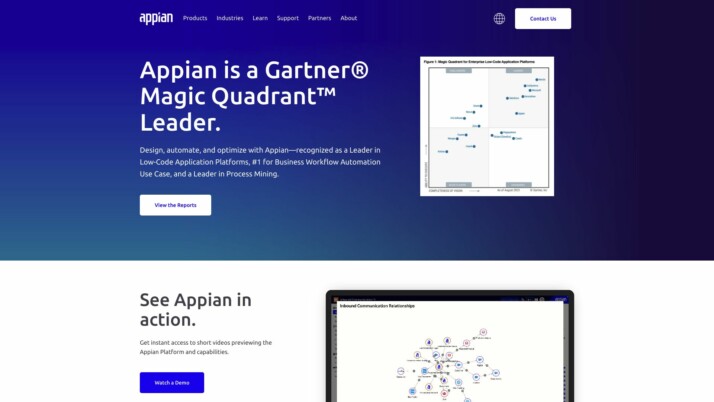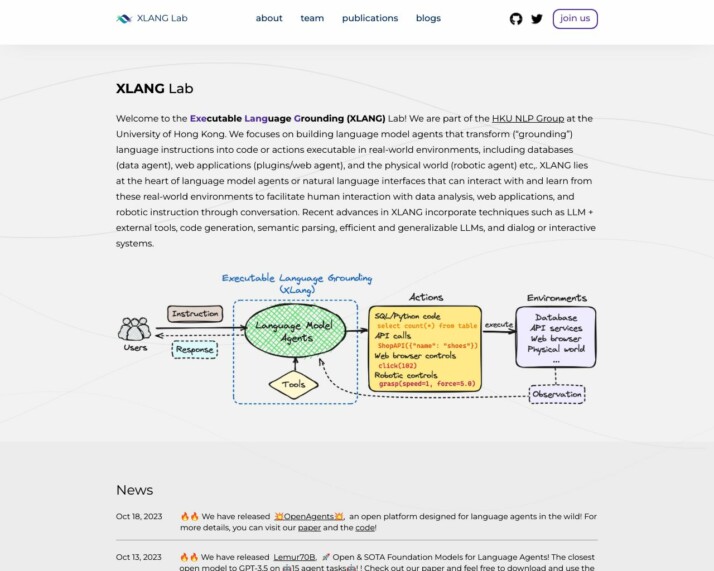Appian vs. OpenAgents: Comparing AI Platforms for Business Automation
AI-powered platforms revolutionize how businesses operate, automate processes, and extract insights from data. Appian vs. OpenAgents, and SmythOS offer unique approaches to harnessing AI’s potential. Appian focuses on low-code AI integration for business process automation.
OpenAgents provides specialized AI agents for data analysis, web browsing, and diverse tasks. SmythOS combines the strengths of both, offering an accessible yet powerful platform for AI development and deployment. This comparison explores each platform’s key features, use cases, and target audiences, helping you choose the best AI solution for your needs.
Appian Overview
Appian delivers a low-code platform that empowers organizations to build AI-driven applications and automate complex business processes. The platform combines visual development tools with powerful AI capabilities, enabling both technical and non-technical users to create intelligent solutions.


Appian’s AI Skill Designer allows users to craft custom AI models without extensive data science expertise. This tool democratizes AI development, making it accessible to a broader range of professionals. The platform also offers pre-built AI capabilities for document classification, data extraction, and email routing, streamlining common business tasks.
Appian’s AI Skill Designer allows users to craft custom AI models without extensive data science expertise. This tool democratizes AI development, making it accessible to a broader range of professionals.
Security and privacy stand out as key strengths of Appian’s AI offerings. The platform ensures that AI models and data remain under the user’s control, addressing crucial concerns for businesses handling sensitive information. Appian also integrates with external AI services like OpenAI, expanding its natural language processing capabilities for tasks such as email automation and document management.
While Appian excels in process automation and AI integration, it lacks some advanced features found in dedicated AI agent platforms. The platform does not offer explicit support for autonomous agents, multi-agent collaboration, or advanced debugging tools for AI models. Additionally, Appian’s focus on business process automation may limit its appeal for users seeking more general-purpose AI development environments.
Appian’s strength lies in its seamless integration of AI capabilities with robust process management tools. This combination allows businesses to enhance their operations with intelligent automation, improving efficiency and accuracy across various workflows. The platform’s low-code approach and emphasis on user-friendly design make it particularly suitable for organizations looking to quickly implement AI solutions without extensive technical resources.
OpenAgents Overview
OpenAgents introduces an innovative open-source platform for creating, hosting, and managing AI agents. The system centers around three specialized agents: Data Agent, Plugins Agent, and Web Agent.


The Data Agent excels in complex data analysis, offering powerful capabilities for searching, manipulating, and visualizing large datasets. Marketing professionals and data analysts benefit from its ability to generate actionable insights efficiently.
OpenAgents’ Plugins Agent stands out with its extensive library of over 200 integrated plugins. This versatility allows users to accomplish a wide array of tasks, from checking weather forecasts to online shopping and accessing scientific databases. The sheer range of functionalities makes this agent adaptable to diverse user needs across multiple domains.
OpenAgents’ Plugins Agent stands out with its extensive library of over 200 integrated plugins… from checking weather forecasts to online shopping and accessing scientific databases.
The Web Agent revolutionizes internet browsing through its Chrome extension, automating navigation and exploration of websites. This autonomous web interaction streamlines information gathering and resource access, enhancing productivity for users who rely on web-based tasks.
OpenAgents prioritizes user-friendliness with its intuitive web interface and robust backend server, facilitating smooth communication with the AI agents. This design approach makes advanced AI capabilities accessible to non-expert users, bridging the gap between complex technology and practical applications.
While OpenAgents offers impressive capabilities, it faces challenges in areas such as scalability for enterprise-level deployments and limited options for customizing agent behaviors beyond the predefined functionalities. The platform’s open-source nature, however, provides opportunities for community-driven enhancements and adaptations to specific use cases.
Feature Comparison
Appian and OpenAgents offer distinct approaches to AI integration and development, with notable differences in their core capabilities and focus areas.
Appian excels in process automation and low-code AI integration, providing a robust platform for businesses to enhance their operations with intelligent automation. Its AI Skill Designer allows users to create custom AI models without extensive data science expertise, democratizing AI development within organizations. Appian also offers pre-built AI capabilities for document classification, data extraction, and email routing, streamlining common business tasks.
In contrast, OpenAgents focuses on specialized AI agents for specific tasks. Its Data Agent provides powerful data analysis and visualization capabilities, while the Plugins Agent offers versatility through over 200 integrated plugins for various daily tasks. OpenAgents’ Web Agent, with its Chrome extension, automates web browsing and information gathering, a feature not present in Appian’s offerings.
Security and data privacy are key strengths for Appian, ensuring AI models and data remain under user control. This addresses crucial concerns for businesses handling sensitive information. OpenAgents, being open-source, may require additional measures for enterprise-level security and compliance.
While Appian integrates seamlessly with business processes and existing systems, OpenAgents provides a more flexible platform for creating autonomous agents capable of complex, specialized tasks. Appian’s strength lies in enhancing business operations, while OpenAgents excels in creating versatile AI assistants for diverse applications.
SmythOS, our platform, offers the best of both worlds. We combine the ease of use and business process integration capabilities of Appian with the flexibility and specialized agent creation of OpenAgents. Our visual builder and no-code options make AI development accessible, while our advanced features like multi-agent collaboration and autonomous agent capabilities push the boundaries of what’s possible with AI. Unlike Appian and OpenAgents, we provide comprehensive debugging tools, a wide range of deployment options, and superior scalability, making us the ideal choice for businesses of all sizes seeking to leverage AI effectively.
Feature Comparison Table
| Appian | OpenAgents | SmythOS | |
|---|---|---|---|
| CORE FEATURES | |||
| Hosted Agents (Dev, Production) | ❌ | ✅ | ✅ |
| Visual Builder | ✅ | ❌ | ✅ |
| No-Code Options | ✅ | ❌ | ✅ |
| Autonomous Agents | ❌ | ✅ | ✅ |
| Multi-Agent Collaboration | ❌ | ✅ | ✅ |
| Agent Work Scheduler | ❌ | ❌ | ✅ |
| SECURITY | |||
| Constrained Alignment | ✅ | ❌ | ✅ |
| IP Control | ✅ | ❌ | ✅ |
| COMPONENTS | |||
| Foundation AIs | ❌ | ✅ | ✅ |
| Huggingface AIs | ❌ | ✅ | ✅ |
| Zapier APIs | ❌ | ✅ | ✅ |
| Data Lakes | ✅ | ❌ | ✅ |
| DEPLOYMENT OPTIONS (EMBODIMENTS) | |||
| Staging Domains | ✅ | ❌ | ✅ |
| Production Domains | ✅ | ❌ | ✅ |
| Deploy as Site Chat | ❌ | ✅ | ✅ |
| Deploy as Scheduled Agent | ❌ | ❌ | ✅ |
| Deploy as GPT | ❌ | ✅ | ✅ |
| DATA LAKE SUPPORT | |||
| Hosted Vector Database | ❌ | ❌ | ✅ |
| Sitemap Crawler | ❌ | ❌ | ✅ |
| YouTube Transcript Crawler | ❌ | ❌ | ✅ |
| URL Crawler | ❌ | ✅ | ✅ |
Best Alternative to Appian and OpenAgents
SmythOS stands out as the premier alternative to Appian and OpenAgents, offering a comprehensive platform for AI agent development and deployment. We combine the best aspects of both competitors while providing unique advantages that set us apart in the AI automation landscape.
Our visual builder and no-code options make AI development accessible to users of all skill levels, similar to Appian’s low-code approach. However, we take it a step further by offering a more intuitive drag-and-drop interface that allows for rapid prototyping and deployment of complex AI workflows. Unlike OpenAgents’ specialized agents, our platform enables the creation of versatile, multi-purpose agents that can adapt to a wide range of tasks and industries.
SmythOS excels in providing enterprise-grade security and scalability, addressing the needs of businesses handling sensitive data.
SmythOS excels in providing enterprise-grade security and scalability, addressing the needs of businesses handling sensitive data. While Appian focuses on process automation, we offer a more comprehensive suite of AI capabilities, including autonomous agents, multi-agent collaboration, and advanced problem-solving features. Our platform supports a wider range of AI models and integrations, including Hugging Face and Zapier, giving users more flexibility in their AI development projects.
One of our key differentiators is the ability to deploy AI agents across various environments and formats. Whether you need to create a chatbot, an API, or a scheduled agent, SmythOS provides the tools and infrastructure to make it happen. This versatility, combined with our hosted vector database and advanced data lake support, enables the development of more sophisticated and capable AI solutions compared to both Appian and OpenAgents.
By choosing SmythOS, you’re not just getting an AI agent builder – you’re gaining access to a complete ecosystem for AI development, deployment, and management. Our platform empowers users to create truly intelligent, autonomous agents that can transform business processes and drive innovation across industries. With SmythOS, the possibilities for AI-driven solutions are limitless, making it the clear choice for those seeking to harness the full potential of artificial intelligence.
Conclusion
Appian and OpenAgents offer distinct approaches to AI integration, each with unique strengths. Appian excels in low-code AI development and business process automation, making it suitable for enterprises seeking to enhance their operations with intelligent workflows. OpenAgents, with its specialized agents for data analysis, web browsing, and diverse plugin integrations, caters to users looking for versatile AI assistants in everyday tasks.
However, SmythOS emerges as the superior choice, combining the best aspects of both platforms while offering additional cutting-edge features. Our drag-and-drop interface rivals Appian’s low-code approach, making AI development accessible to both technical and non-technical users. We surpass OpenAgents’ plugin ecosystem with over 300,000 integrations, providing unparalleled flexibility in connecting various tools and services.
Unlike Appian and OpenAgents, SmythOS offers advanced capabilities such as multi-agent collaboration, autonomous agent creation, and comprehensive debugging tools. Our platform supports a wide range of deployment options, from APIs and chatbots to scheduled agents and GPT integrations, ensuring that AI solutions can be seamlessly integrated into any workflow or system.
For businesses and individuals looking to harness the full potential of AI, SmythOS provides the ideal balance of power, flexibility, and ease of use. We invite you to explore our diverse range of AI-powered agent templates and experience firsthand how SmythOS can revolutionize your approach to AI development and automation. Get started with SmythOS today and join the forefront of the AI revolution.
Last updated:
Disclaimer: The information presented in this article is for general informational purposes only and is provided as is. While we strive to keep the content up-to-date and accurate, we make no representations or warranties of any kind, express or implied, about the completeness, accuracy, reliability, suitability, or availability of the information contained in this article.
Any reliance you place on such information is strictly at your own risk. We reserve the right to make additions, deletions, or modifications to the contents of this article at any time without prior notice.
In no event will we be liable for any loss or damage including without limitation, indirect or consequential loss or damage, or any loss or damage whatsoever arising from loss of data, profits, or any other loss not specified herein arising out of, or in connection with, the use of this article.
Despite our best efforts, this article may contain oversights, errors, or omissions. If you notice any inaccuracies or have concerns about the content, please report them through our content feedback form. Your input helps us maintain the quality and reliability of our information.
